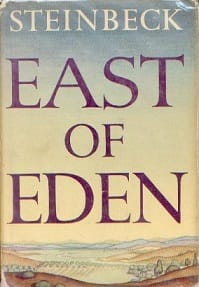
I’ve been a huge fan of John Steinbeck ever since I read his “Grapes of Wrath” novel. I heard about East of Eden from a section in goodreads.com called “Big fat books worth the effort”. And it was worth the effort. It really was.
I’ve always liked books that start at one generation and traces the lives of a family and their descendents. It’s a variation of the Bildungsroman style of writing that follows the character development of a single individual. 100 years of solitude also has something of the same pattern of writing. But East of Eden is very different. It’s far more personal. More character based. And it’s bittersweet. Like very strong tea that you nonetheless enjoy.
There are two families here – the Hamiltons and the Trasks. And then there’s Cathy. I don’t know much about the portrayals of sociopaths in literature, but surely Cathy must rank as one of the best. She’s creepy. And cold. And the author is never sure of whether to call her a monster or not. On the other hand we have Samuel Hamilton. The soul of the series whose influence is felt right up to the very end even when he’s not around. Just thinking about the Hamilton family is enough to make you want to grow up in a house teeming with siblings :).
To me, Adam Trask is the weakest of all. He’s willfully blind. He doesn’t notice the truth about Cathy. Doesn’t notice the truth about his sons. Entirely too caught up in his own self indulgent whining. If it wasn’t for the standout personality of Lee, the Trask household would have been a disaster. At least…more of a disaster than it was. And Cal was a surprise. I thought he would go the way of his mother at the beginning. But not so. Thanks in no small part, to Lee.
There’s no real “plot” here. It’s a story of two families. And it’s surprising to me how I enjoy these kinds of books. The development of characters and families. To see certain traits reappear in a descendent. To see the phrase “A man’s character is his fate” play out. How the knocks and joys of childhood affect one’s later development. Riveting stuff.
I liked John Steinbeck before for his understanding of industrialization and how it pushed farmers off their land. I now hold him in even higher regard for his portrayal of human beings. A wonderful, wonderful book.
